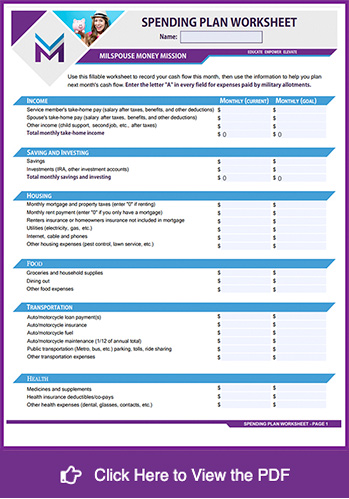Why Create a Budget?
Budgeting Helps You:
- Prioritize how money is spent.
- Discover areas of waste.
- Prepare for unexpected expenses.
- Save for your family's future.
- Reduce money-related stress.
Creating and following a budget is essential to financial security. Though many powerful tools are available to help you manage money, a pencil and paper will suffice. Let's get started!


Why Create a Budget
Budgeting Helps You:
- Prioritize how money is spent.
- Discover areas of waste.
- Prepare for unexpected expenses.
- Save for your family's future.
- Reduce money-related stress.
Creating and following a budget is essential to financial security. Though many powerful tools are available to help you manage money, a pencil and paper will suffice. Let's get started!

Create a Budget

Understand Your Current Situation
If you’re not already there, it’s time to get up close and personal with your cash inflows and outflows. Track everything coming in and going out, so you’ll have a solid grip on what needs to change. Notice the additional resources in our sidebar.
For inflows, pay attention to more than just a paycheck. Gifts, tax refunds, rebates, proceeds from selling stuff – if it is money coming in, it all counts.
For outflows, the same thinking applies. Out-of-the-ordinary expenses like gifts or new tires for your car need to be accounted for just like recurring outflows.

Know Where Your Money Should Go
Every situation is different but there are some great budgeting rules that can help you get on the right path. For example, saving and investing should generally be 10-15% of pre-tax pay. Transportation expenses, including payment, insurance, fuel and maintenance, should be less than 15-20%. Housing expenses should generally be less than 25% of your pre-tax pay.

Create a Plan
Once you know what your situation really looks like and what you should be doing with your money, it’s time to put the two together and make a plan.
Funding your goals should come first, and when it comes to cutting back, no expense category should be off the table.
Just be careful not to cut so much that you won’t be able to sustain your plan over the long term.

Make Adjustments
As your life changes, so should your budget in many cases. Try to anticipate upcoming changes to both inflows and outflows so you can make adjustments sooner, rather than later.
A good plan will require frequent adjustments to make sure it evolves with your life.

MilLife Milestones
Dig Deeper


Related Videos







Create a Budget

Understand Your Current Situation
If you’re not already there, it’s time to get up close and personal with your cash inflows and outflows. Track everything coming in and going out, so you’ll have a solid grip on what needs to change. Notice the additional resources in our sidebar.
For inflows, pay attention to more than just a paycheck. Gifts, tax refunds, rebates, proceeds from selling stuff – if it is money coming in, it all counts.
For outflows, the same thinking applies. Out-of-the-ordinary expenses like gifts or new tires for your car need to be accounted for just like recurring outflows.

Know Where Your Money Should Go
Every situation is different but there are some great budgeting rules that can help you get on the right path. For example, saving and investing should generally be 10-15% of pre-tax pay. Transportation expenses, including payment, insurance, fuel and maintenance, should be less than 15-20%. Housing expenses should generally be less than 25% of your pre-tax pay.

Create a Plan
Once you know what your situation really looks like and what you should be doing with your money, it’s time to put the two together and make a plan.
Funding your goals should come first, and when it comes to cutting back, no expense category should be off the table.
Just be careful not to cut so much that you won’t be able to sustain your plan over the long term.

Make Adjustments
As your life changes, so should your budget in many cases. Try to anticipate upcoming changes to both inflows and outflows so you can make adjustments sooner, rather than later.
A good plan will require frequent adjustments to make sure it evolves with your life.

MilLife Milestones
Dig Deeper


Related Videos






Recent Blogs
Honoring the Heart of Our Military: The Resilient Spouses
Military spouses are the unsung heroes of our military community. Their unwavering dedication, resilience and incredible adaptability are the backbone of our military families and communities. Military spouses manage households, raise families, often pursue careers or volunteer tirelessly, all while navigating the unique challenges of military life — frequent moves, deployments, and the emotional toll…
Read MoreGiving Military Kids the Tools to Be Financially Capable
Military families are known for resilience, yet the frequent moves, deployments, and changes in income that come with military life can make financial stability feel like a juggling act. But these unique challenges may offer a golden teaching opportunity for military kids. By talking about finances openly and equipping kids with financial skills early on,…
Read MoreMarch Money Moves: Navigating Tax Season While Preparing for Summer Fun
As we welcome the arrival of spring and the promise of warmer weather, it’s easy to get caught up in thoughts of summer plans and family vacations. But with tax season in full swing, it’s important to balance excitement for the upcoming months with a push to wrap up tax season. While those topics couldn’t…
Read MoreCommunicating with Your Partner About Finances: A February Focus on Financial Wellness
Talking Money with Your Partner As we celebrate loving relationships this month, it’s important to remember that not all conversations come up roses between couples. Sometimes discussing finances can be tricky and stir up negative emotions. Open communication about money is vital for building trust and nurturing a healthy relationship. Whether you’re a new couple…
Read MoreBuild Financial Wellness from the Ground Up in 2025
There’s something magical about the ball dropping at midnight and turning the page to a new year. For an instant, it feels like you’ve got a clean slate, and anything is possible. In some ways that’s true, but as the calendar page turns, your responsibilities, bills and financial challenges remain. Many people make resolutions to…
Read More5 Financial Resolutions to Start the New Year Off Right
You don’t need to wait until January to take a fresh look at your finances. Get a jump on the new year with these five resolutions — they can really pay off over the next 12 months. 1. Set/update your budget Setting a budget is the first step in a military family’s financial planning. And…
Read More5 Financial Power Moves for MilSpouses
During National Veterans and Military Families Month in November, we salute the strength of our families as they support the mission of our community. MilSpouses, especially, display determination as they face the challenges of military life. We see you navigate frequent moves, deployments and often raising children as a solo parent. We understand your motivation…
Read MoreThe Year In Review: Bring Your Financial Picture into Focus
It can be fun and even eye-opening to watch those year-end montages reminiscing about the year. If you ever have that moment when you say to yourself, “Wait, that was this year?”, you could also imagine how easy it could be to lose track of the goals and financial plans you set in motion when…
Read More










